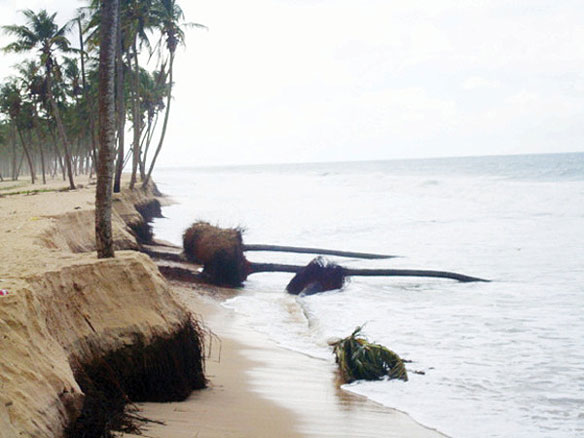Environmental experts, under the aegis of the Academic Associates Peace Works (AAPW), have warned that several coastal communities in the Niger Delta region may disappear by 2050 if environmental protection laws are not enforced.

The Executive Director of the group, Dr Judith Asuni, made the remark during a workshop themed, “Conflicts in Coastal Communities,” in Port Harcourt, on Monday, April 28, 2025.
She said that the workshop was organised by the group and funded by the European Union through the C7 project.
She noted that climate change had a devastating impact on the Niger Delta.
Asuni said that the rising sea levels and frequent flooding had fueled communal conflicts, displaced residents, and intensified competition over dwindling resources.
“Displacement has triggered recurrent land disputes and increased communal tensions in this region,” she said.
Asuni urged government at all levels to take urgent action to enforce environmental protection laws and mitigate the impacts of climate change on coastal communities.
Also speaking, Mrs. Nkoyo Toyo, the Deputy Director, AAPW, emphasised the urgent need to enforce environmental laws to address land encroachment, loss of aquatic biodiversity, and climate-induced migration in the Niger Delta region.
Toyo noted that the coastal region, spanning hundreds of kilometers, was a fragile ecosystem under threat from multiple angles, with climate change being a critical factor.
She attributed environmental degradation to unregulated practices of oil companies and the failure to regulate emissions and enforce environmental standards.
By Precious Akutamadu
Toyo explained that environmental degradation contributed to migration and scarcity of resources, heightening the risk of violent conflict.
“When people are displaced and resources become scarce, tensions rise, making it impossible to address conflict without addressing environmental and climate issues,” she added.
Toyo called for a holistic approach to environmental enforcement, involving community leaders, policymakers, and security agencies.
She cited traditional conservation practices, such as seasonal bans on fishing, as examples of grassroots efforts that are being undermined by external actors.
She noted that leveraging on the potentials of the Petroleum Industry Act (PIA) for infrastructure development could protect vulnerable communities from the impacts of sea level rise and flooding.
Also Mrs Nimi Elele, representing the Rivers State Ministry of Environment’s Climate Change Desk, warned that entire communities in the Niger Delta region could vanish unless urgent measures were taken to mitigate the impacts of climate change.
Elele noted that sea-level rising during the rainy season led to severe flooding, damaging infrastructure and forcing people to migrate inland.
According to her, damage of infrastructure and inland migration increases social risks, including child molestation and sexual abuse.
“Fishing yields have dropped significantly, pushing many coastal dwellers into poverty and hunger.
‘’If urgent action like public awareness campaign to educate residents on the causes and consequences of climate change and implementation of policies are not taken, we are bound for extinction,” she said.
Participants from Bayelsa, Akwa Ibom, Cross River, Delta, and Rivers who attended the workshop, called for government immediate action.
